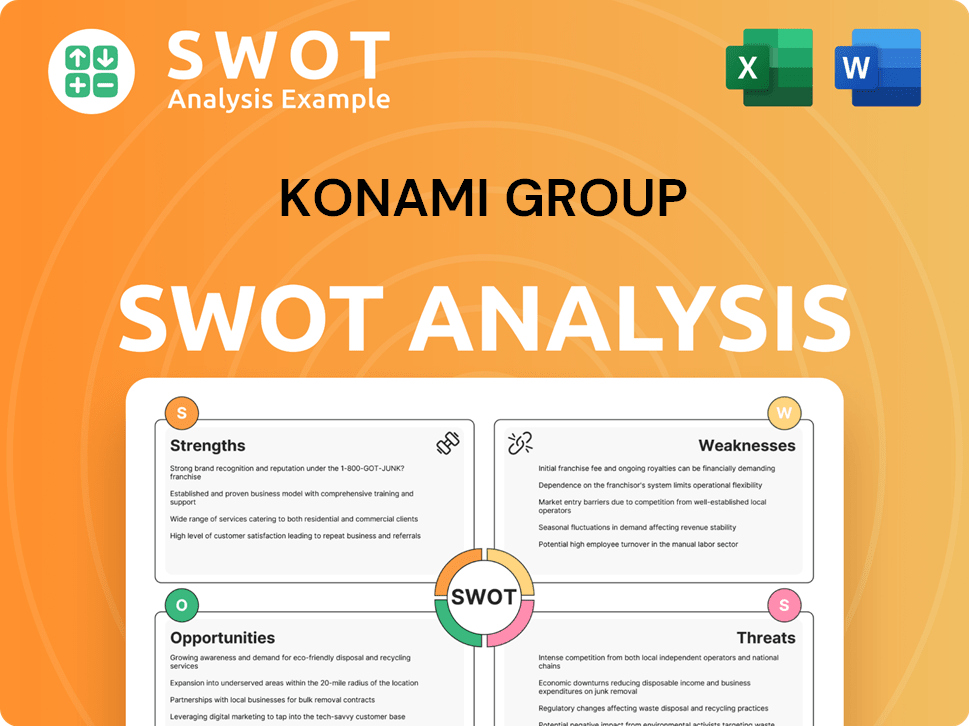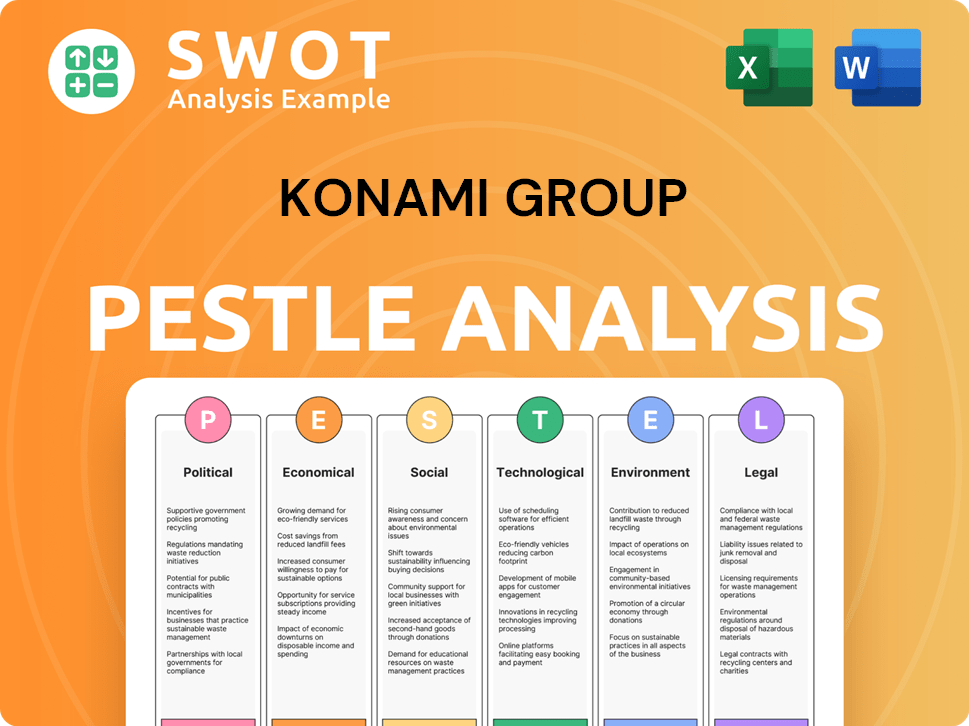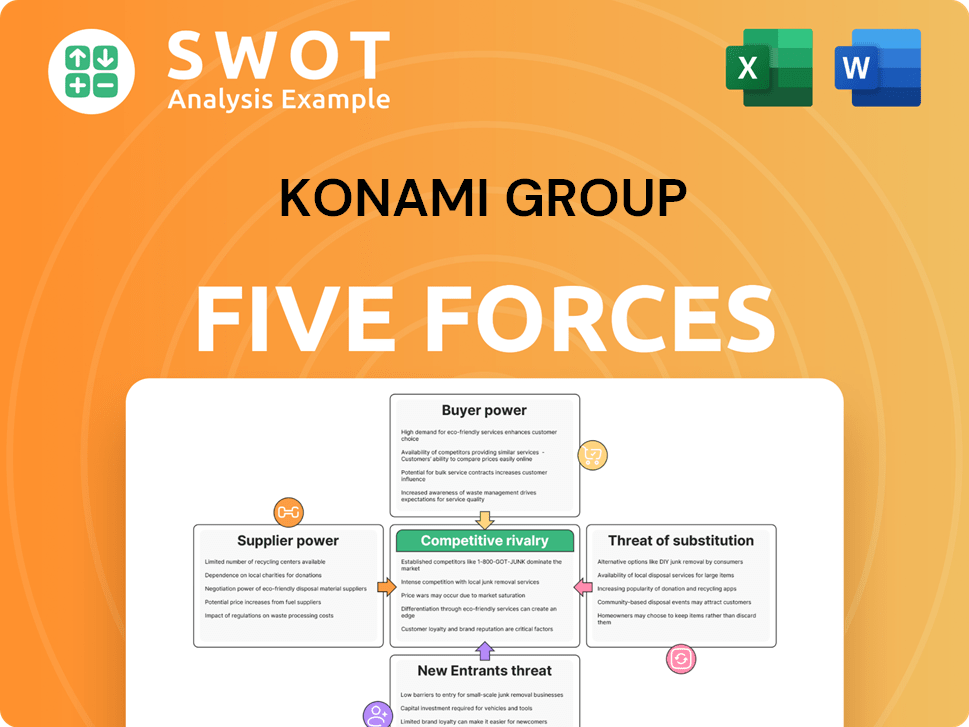Konami Group Bundle
How did a jukebox repair shop become a global entertainment giant?
Konami Group Corporation's story is a testament to the power of innovation and adaptability. From its humble beginnings, this Japanese gaming company has continuously redefined entertainment. This journey from a jukebox rental and repair business to a multinational conglomerate is fascinating.

Konami's Konami Group SWOT Analysis reveals a company with a rich Konami history, marked by strategic expansions and a keen understanding of market trends. Starting as a small business, Konami company rapidly evolved, embracing video game development and arcade games to become a major player in the industry. Understanding Konami's evolution from arcade to home consoles is key to appreciating its current success.
What is the Konami Group Founding Story?
The Konami history begins in Osaka, Japan, on March 21, 1969. It was founded by Kagemasa Kōzuki, who remains the chairman of the Konami Group. Initially, the company focused on the leisure sector, specifically jukebox rental and repair.
The official incorporation of the company, under the name Konami Industry Co., Ltd., occurred on March 19, 1973. The initial capital was 1 million yen. This marked a shift in focus towards manufacturing amusement machines for arcades, a key step in Konami's early development.
The name 'Konami' is a portmanteau, derived from the names of three founding members: Kagemasa Kōzuki, Yoshinobu Nakama, and Tatsuo Miyasako. A capital increase to 4 million yen in February 1974 further fueled the company's expansion. This transition from jukeboxes to arcade machine manufacturing was a pivotal moment, setting the stage for Konami's role in the entertainment technology landscape of the 1970s. For more details on their strategic growth, check out the Growth Strategy of Konami Group.
Here are some key facts about the founding of Konami:
- Founded on March 21, 1969, in Osaka, Japan.
- Founder: Kagemasa Kōzuki.
- Initially focused on jukebox rental and repair.
- Officially incorporated on March 19, 1973, as Konami Industry Co., Ltd.
- Initial capital of 1 million yen.
- Shifted to manufacturing arcade machines.
Konami Group SWOT Analysis
- Complete SWOT Breakdown
- Fully Customizable
- Editable in Excel & Word
- Professional Formatting
- Investor-Ready Format

What Drove the Early Growth of Konami Group?
The early years of the Konami Group saw a swift transition from jukebox repair to arcade game manufacturing. This period marked the beginning of its global expansion, with hits like 'Frogger' and 'Scramble' establishing its presence in the international market. The company also strategically diversified its business, entering new markets and consolidating its operations to become a major player in the entertainment industry.
In 1981, Konami launched 'Frogger' and 'Scramble,' which were instrumental in establishing the company's reputation in the arcade market. These games demonstrated the company's ability to create engaging gameplay, which was key to its early success. This early period was crucial for the Japanese gaming company as it laid the foundation for future ventures.
The company expanded into the PC game business and supported 16-bit video game consoles, including the Super NES, PC Engine, and Sega Genesis. By June 1991, the company's legal name was changed to Konami Co., Ltd. The headquarters were relocated to Minato, Tokyo, in April 1993, reflecting its growing stature in the industry. The company's growth is also discussed in Target Market of Konami Group.
The company made significant moves into new markets, including the pachislot and pachinko machine business. Strategic expansions included establishing Konami of America, Inc. in the United States and Konami Australia Pty Ltd in Australia. By 2002, the company's revenues exceeded $1.7 billion, showing its financial success.
In 2005, Konami Corporation merged with several subsidiaries, including Konami Computer Entertainment Tokyo, Inc. and Konami Computer Entertainment Japan, Inc. This consolidation streamlined operations and improved efficiency. This period of early growth was characterized by rapid diversification and a strategic push for international presence, laying the groundwork for its future.
Konami Group PESTLE Analysis
- Covers All 6 PESTLE Categories
- No Research Needed – Save Hours of Work
- Built by Experts, Trusted by Consultants
- Instant Download, Ready to Use
- 100% Editable, Fully Customizable

What are the key Milestones in Konami Group history?
The Konami history is marked by significant milestones, from its early days in the arcade scene to its evolution into a global Japanese gaming company. The Konami company has consistently adapted to changing market dynamics, establishing itself as a key player in the video game developer landscape.
| Year | Milestone |
|---|---|
| 1969 | Founded as a jukebox rental and repair business in Toyonaka, Osaka, Japan. |
| 1973 | Began producing arcade games, marking its entry into the arcade games market. |
| 1985 | Released 'Gradius', a groundbreaking title that established a long-running franchise and introduced the 'Konami Code.' |
| 1986 | Launched 'Castlevania', which solidified its reputation for action-adventure games. |
| 1987 | Released 'Contra', known for its cooperative gameplay. |
| 2001 | The 'Yu-Gi-Oh! Trading Card Game' was released, becoming a top-selling trading card game. |
| 2011 | The 'Yu-Gi-Oh! Trading Card Game' became the top-selling trading card game in history, with 25.2 billion cards sold worldwide. |
Konami Group has been at the forefront of technological advancements, particularly in arcade gaming, with innovations in control systems and immersive experiences. The company's ability to blend gameplay with cutting-edge technology has consistently set industry standards.
The introduction of 'Gradius' in 1985 not only established a successful franchise but also popularized the 'Konami Code,' a sequence of button presses that became a cultural phenomenon. This innovation enhanced player engagement and game enjoyment.
Konami's development of 'Dance Dance Revolution' revolutionized the rhythm game genre, introducing innovative control systems that combined physical activity with gaming. This innovation expanded the appeal of arcade games.
Konami consistently pushed the boundaries of arcade technology, integrating advanced cinematic graphics and sound into its titles. This focus on immersive experiences enhanced the appeal of their arcade games.
The creation of the 'Yu-Gi-Oh!' Trading Card Game, which became a top-selling trading card game, showcased Konami's ability to innovate beyond video games. This expansion into trading card games broadened the company's revenue streams.
The steady sales increases of its DIMENSION cabinet series in casino gaming throughout FY 2024/25 demonstrates Konami's ability to adapt and maintain a strong market position. This shows the company's resilience in a competitive market.
Konami is investing approximately ¥30 billion for R&D in the current fiscal year to shorten game development cycles and enhance product quality. This investment highlights the company's commitment to innovation.
Despite its successes, Konami has faced challenges, including market downturns and operational hurdles. Delays in game launches and increased competition have impacted the company's financial performance.
Konami reported a 25% decline in digital entertainment revenue in its latest earnings release, partly due to delays and increased competition. This decline highlights the challenges in the fast-paced video game market.
The health and fitness segment experienced an 11.8% revenue decrease in fiscal year 2023, reflecting post-COVID-19 pandemic challenges. This indicates difficulties in diversifying beyond its core gaming business.
Intense competition from other major video game developer and evolving consumer preferences pose ongoing challenges for Konami. Adapting to these changes is crucial for maintaining market share.
Delays in launching major titles have impacted player engagement and revenue forecasts, affecting Konami's financial performance. This highlights the need for efficient project management.
The gaming market is subject to volatility, influenced by technological advancements and consumer trends, which requires Konami to remain adaptable. This impacts the company's long-term strategy.
Strategic shifts, such as diversifying beyond gaming into health and fitness, have presented challenges. This requires Konami to navigate new markets and adapt its business model.
To understand more about Konami's financial strategies, you can read Revenue Streams & Business Model of Konami Group.
Konami Group Business Model Canvas
- Complete 9-Block Business Model Canvas
- Effortlessly Communicate Your Business Strategy
- Investor-Ready BMC Format
- 100% Editable and Customizable
- Clear and Structured Layout

What is the Timeline of Key Events for Konami Group?
The Konami Group, a prominent Japanese gaming company, has a rich history marked by innovation and adaptation. From its inception as a jukebox rental and repair business in 1969 to its current status as a global leader in digital entertainment, Konami has consistently evolved. Key milestones include the establishment of Konami Industry Co., Ltd. in 1973, the release of iconic arcade games like 'Frogger' and 'Scramble' in 1981, and the introduction of the 'Konami Code' with the game 'Gradius' in 1985. The company has expanded its reach globally, entering the gaming machine market in 1996 and transforming into a holding company in 2006. By October 2022, the company changed its trade name to Konami Group Corporation, reflecting its diverse business interests.
| Year | Key Event |
|---|---|
| March 21, 1969 | Kagemasa Kōzuki founded his business in Osaka, Japan, initially focusing on jukebox rental and repair. |
| March 19, 1973 | Konami Industry Co., Ltd. was officially established, shifting to the manufacturing of amusement machines. |
| 1981 | Release of 'Frogger' and 'Scramble,' Konami's first major arcade hits. |
| 1985 | 'Gradius' was released, establishing a key franchise and introducing the 'Konami Code.' |
| 1991 | Company name changed to Konami Co., Ltd., with headquarters relocating to Minato, Tokyo in 1993. |
| 1996 | Konami entered the global gaming machine market, establishing Konami Australia Pty Ltd and Konami Gaming, Inc. in the U.S. |
| 2000 | Corporate name changed to Konami Corporation. |
| 2005 | Konami Corporation merged with several subsidiaries, including Konami Computer Entertainment Tokyo. |
| March 31, 2006 | Konami Digital Entertainment Co., Ltd. was established as a new subsidiary for video game development and publishing, and Konami Corporation became a holding company. |
| 2011 | 'Yu-Gi-Oh! Trading Card Game' was recognized by Guinness World Records as the top-selling trading card game. |
| October 2022 | Konami Holdings Corporation changed its trade name to Konami Group Corporation. |
| March 2023 | KONAMI Osaka Studio opened. |
| October 2024 | Release of the 'Silent Hill 2' remake, selling over 2 million copies. |
| March 31, 2025 | Konami Group reported total revenue of ¥421.6 billion and profit attributable to owners of the parent at ¥74.7 billion, marking record highs for the second consecutive year. |
Konami Group is focused on expanding its digital entertainment business. This includes further development of existing content like 'eFootball,' which reached over 800 million downloads by February 2025. The company also plans to reboot leading intellectual properties (IPs), ensuring a steady stream of engaging content for its audience.
The company is exploring new business opportunities using Web3.0, NFTs, AI, VR/AR, and 5G/6G technologies. This strategic move aims to diversify its portfolio and stay at the forefront of technological advancements within the gaming and entertainment industries. Konami is looking at innovative ways to engage its audience.
In the Sports segment, Konami is focusing on asset-light business models. A key part of this strategy involves expanding its 'Pilates Mirror' studio brand. This approach allows for scalable growth and efficient resource management, contributing to the company's overall profitability.
For the fiscal year ending March 31, 2026, Konami forecasts revenue to reach ¥430.0 billion, a 2% year-on-year increase, and business profit to be ¥114.0 billion, a 4.5% increase year-on-year. Analyst predictions suggest earnings and revenue are forecast to grow by 11% and 7.1% per annum respectively over the next three years.
Konami Group Porter's Five Forces Analysis
- Covers All 5 Competitive Forces in Detail
- Structured for Consultants, Students, and Founders
- 100% Editable in Microsoft Word & Excel
- Instant Digital Download – Use Immediately
- Compatible with Mac & PC – Fully Unlocked

Related Blogs
- What is Competitive Landscape of Konami Group Company?
- What is Growth Strategy and Future Prospects of Konami Group Company?
- How Does Konami Group Company Work?
- What is Sales and Marketing Strategy of Konami Group Company?
- What is Brief History of Konami Group Company?
- Who Owns Konami Group Company?
- What is Customer Demographics and Target Market of Konami Group Company?
Disclaimer
All information, articles, and product details provided on this website are for general informational and educational purposes only. We do not claim any ownership over, nor do we intend to infringe upon, any trademarks, copyrights, logos, brand names, or other intellectual property mentioned or depicted on this site. Such intellectual property remains the property of its respective owners, and any references here are made solely for identification or informational purposes, without implying any affiliation, endorsement, or partnership.
We make no representations or warranties, express or implied, regarding the accuracy, completeness, or suitability of any content or products presented. Nothing on this website should be construed as legal, tax, investment, financial, medical, or other professional advice. In addition, no part of this site—including articles or product references—constitutes a solicitation, recommendation, endorsement, advertisement, or offer to buy or sell any securities, franchises, or other financial instruments, particularly in jurisdictions where such activity would be unlawful.
All content is of a general nature and may not address the specific circumstances of any individual or entity. It is not a substitute for professional advice or services. Any actions you take based on the information provided here are strictly at your own risk. You accept full responsibility for any decisions or outcomes arising from your use of this website and agree to release us from any liability in connection with your use of, or reliance upon, the content or products found herein.